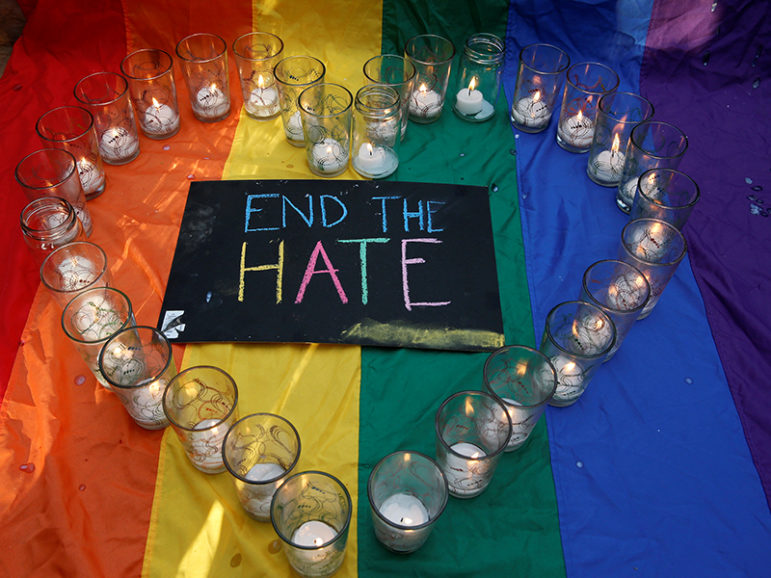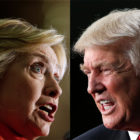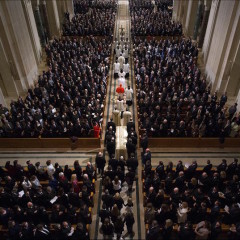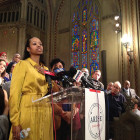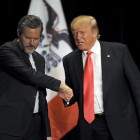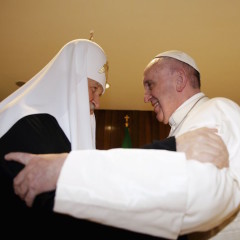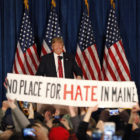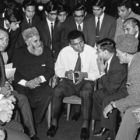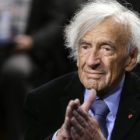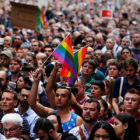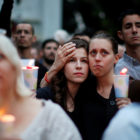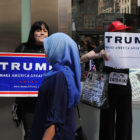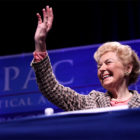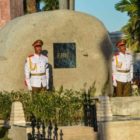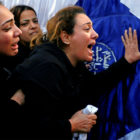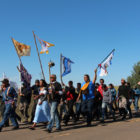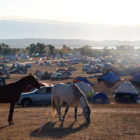(RNS) The 2016 election – with its polarizing campaign and surprising result – produced not only an unexpected president. It also gave us several of the year’s biggest religion news stories.
And while religion gave billions of people meaning in their lives and inspired good deeds, in news coverage it was linked to bloodshed and blamed for fueling bigotry.
Here is a recap of key stories and trends this year:
Trumpvangelicals
Sometimes a number tells us a lot. This year, that number was 81. That was the percentage of white evangelicals who, if the exit polls were accurate, cast ballots for Trump. They helped sway the vote in a way that suggested predictions of the decline of “white Christian America” may be premature.
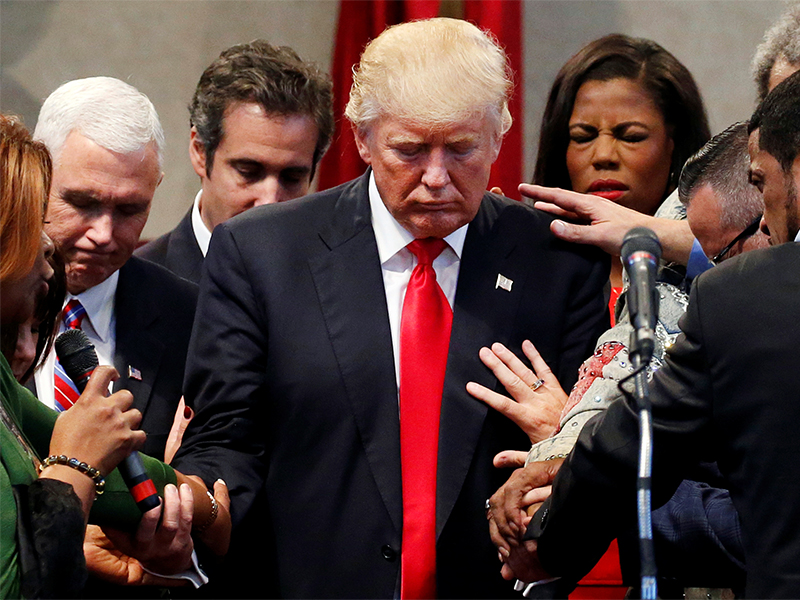
Despite some pretty outspoken reservations on the part of some influential conservative Christians about Trump’s character, he also had his Christian boosters. For so-called Trumpvangelicals, a man whose predatory view of sex seemed more in tune with the movie “Animal House” was worthy of the highest office in the land.
And it followed the rejection of primary candidates who seemed to more clearly espouse their conservative values.
[ad number=“1”]
But can they count on the brash real estate tycoon and reality TV star who has been, it seems, on both sides of almost every issue?
So far, yes. The conservatives’ hand in his victory — some of them believe it was actually God’s hand — seems to have led the president-elect to stack his Cabinet with religious conservatives — including a climate change denier and a national security adviser who called Islam “a political ideology hiding behind a religion.”
What’s in a name?
Given evangelicals’ support for Trump, some started questioning the label. They felt the movement had become politicized and its ideals were falling by the wayside. And some just couldn’t identify with the evangelicalism of some key pro-Trump pastors, especially those who promise riches as a reward for faith.
“Any definition that includes both a health and wealth prosperity gospel teacher and me is a word that’s so broad it’s meaningless,” Russell Moore, president of the Ethics & Religious Liberty Commission of the Southern Baptist Convention, told RNS evangelical beat reporter Emily McFarlan Miller.
What is clear is that the election exposed deep fissures in American evangelical Christianity.
- Democratic presidential nominee Hillary Clinton, left, speaks during a campaign rally in St. Petersburg, Fla., on Aug. 8, 2016. Republican presidential nominee Donald Trump, right, speaks at a campaign rally in Charlotte, N.C.,on Aug. 18, 2016. Left photo courtesy of REUTERS/Chris Keane. Right photo courtesy of REUTERS/Carlo Allegri
- Pallbearers carry the casket down the aisle at the start of the funeral Mass for Associate Justice Antonin Scalia at the Basilica of the National Shrine of the Immaculate Conception in Washington, February 20, 2016. Photo courtesy of Reuters/Doug Mills/Pool
- Larycia Hawkins speaks on Jan. 6, 2016, at First United Methodist Church in Chicago. RNS photo by Emily McFarlan Miller
- Republican presidential candidate Donald Trump shakes hands with co-headliner Jerry Falwell Jr., leader of the nation’s largest Christian university, during a campaign event at the Orpheum Theatre in Sioux City, Iowa, on Jan. 31, 2016.
- French police forces and forensic officers stand next to a truck July 15, 2016 that ran into a crowd celebrating the Bastille Day national holiday on the Promenade des Anglais killing at least 60 people in Nice, France, July 14. Photo courtesy of REUTERS/Eric Gaillard
- Russian Orthodox Patriarch Kirill (L) and Pope Francis embrace in Havana, February 12, 2016. Photo courtesy REUTERS/Max Rossi
- Republican U.S. presidential candidate Donald Trump smiles as protestors hold up a sign reading “No Place for Hate in Maine” during a campaign rally in Portland, Maine on March 3, 2016. Photo courtesy of Reuters/Joel Page
- Muhammad Ali, pictured in London in May 1966, died in 2016. Photo courtesy of Action Images / MSI/File via Reuters
- Nobel Peace Laureate Elie Wiesel died in 2016. Photo courtesy of REUTERS/Gary Cameron
- People gather June 13, 2016, during a vigil outside The Stonewall Inn in New York City to remember the victims of the Orlando, Fla., massacre. Photo courtesy of REUTERS/Shannon Stapleton
- Kassandra Shore, 25, left, and Candice Darden, 29, hold candles June 13, 2016, at a vigil in Los Angeles in memory of victims one day after the mass shooting at the Pulse gay nightclub in Orlando, Fla. Photo courtesy of REUTERS/Lucy Nicholson
- A woman wearing a Muslim headscarf walks past people holding signs backing U.S. Republican presidential nominee Donald Trump before the start of the annual Muslim Day Parade in the Manhattan borough of New York City, on Sept. 25, 2016. Photo courtesy of Reuters/Stephanie Keith
- Phyllis Schlafly, founder of Eagle Forum, died in 2016. Photo by Gage Skidmore via Creative Commons.
- Soldiers stand guard next to a boulder where the ashes of Cuba’s former President Fidel Castro were placed by his brother President Raul Castro (not pictured) at the Santa Ifigenia Cemetery, in Santiago de Cuba, Dec. 4, 2016. Photo by REUTERS/ACN/Marcelino Vazquez
- Egyptian Christians react during the funeral of victims killed in the bombing at Cairo’s Coptic cathedral at the Mokattam Cemetery in Cairo on Dec. 12, 2016. Photo courtesy of Reuters/Amr Abdallah Dalsh
- Several hundred people took part in a prayer walk on Sept. 14, 2016, from the Oceti Sakowin camp near Standing Rock Reservation in North Dakota to the site up the road where Dakota Access began digging over Labor Day weekend for construction on a nearly 1,200-mile pipeline project. RNS photo by Emily McFarlan Miller
- Horses graze early on the morning of Sept. 14, 2016, at the Oceti Sakowin camp near the Standing Rock Reservation in North Dakota, where people camped in solidarity with the Standing Rock Sioux Tribe in opposition to the Dakota Access Pipeline project. RNS photo by Emily McFarlan Miller
Evangelicals and Muslims
One fissure that broke open separately from the election was over the theological view of nonevangelicals, and in particular Muslims. It began last December when Wheaton College began termination proceedings against professor Larycia Hawkins after she donned a Muslim veil and asserted that Muslims and Christians worship the same God.
It was meant as a gesture of solidarity with American Muslims but was seen by administrators and donors at the school, known as the “evangelical Harvard,” as a violation of its statement of faith. Hawkins eventually departed Wheaton, leaving unanswered the question of how far evangelicals can go in accepting the legitimacy of other faiths’ views of God.
Religious bigotry in the campaign
On the campaign trail Trump took aim not at Muslims’ beliefs but at Muslims’ loyalty.
“I think Islam hates us,” he said after proposing a ban on immigrants who profess the faith, which he later modified.
[ad number=“2”]
He tried to justify profiling American Muslims and surveillance of American mosques. And he attacked the Gold Star parents of Army Capt. Humayun Khan, a Muslim U.S. soldier killed in Iraq, after they took the stage at the Democratic convention to endorse Hillary Clinton. That led to an outcry against the Republican candidate, but Muslims reported widespread harassment by his supporters.
Many American Muslims are worried about their future under a Trump administration. But at least they have a new and, to some, surprising ally. The American Jewish Committee formed a partnership against bigotry with the Islamic Society of North America, both concerned by the vitriol Trump campaign unleashed against minorities.
Islamic conflicts
A portion of the anti-Muslim sentiment could be considered a fearful reaction to the immigrant crisis and the violence stemming from political and theological conflicts within the Islamic world, much of it fueled by jihadi violence and the 13-century-old Sunni-Shiite schism.
After more than half a decade, the war in Syria has killed more than 400,000 people and sent millions fleeing. There was at least some relief across the border as Iraqi government and Kurdish Peshmerga forces backed by American advisers and air power pushed Islamic State militants out of key cities in the north, opening up the possibility for refugees – including many Christians – to return to their homes. Many living on the Nineveh Plain had been threatened with death if they didn’t convert to Islam or agree to pay a tax.
In Europe, a man ISIS claimed afterward was its “soldier” drove a Renault cargo truck through the beachside French city of Nice, killing 84 people and injuring hundreds. Two weeks later, armed men stormed a church in northern France and slit the throat of a priest as he was celebrating Mass. The attacks were cited when several French beach towns decided to ban burkinis.
There were massive bombings of churches in Pakistan and Egypt. Atheist bloggers, academics and a Hindu priest were hacked to death in Bangladesh.
And in the United States, a Muslim man opened fire in a gay nightclub in Orlando, killing 49 people, and swearing allegiance to ISIS leader Abu Bakr al-Baghdadi.
Was there any good news?
Not all stories were depressing. With his Oct. 31 visit to Sweden to mark the beginning of the 500th anniversary of the Protestant Reformation, Pope Francis took a big step toward healing a division that rivals the the Sunni-Shiite rift, if not in length of time then in the wars it generated.
Speaking of bygones, a Catholic pope and a Russian Orthodox patriarch met for the first time – in Cuba of all places – since the East-West Schism of 1054. But an attempt to hold the first pan-Orthodox council in 1,200 years fell short because of a Russian boycott.
[ad number=“3”]
And while the world seemed to grow accustomed to Pope Francis’ papacy, he did cause a stir by appearing to suggest that remarried Catholics should be able to receive Communion.
In North Dakota, under the flags of 280 Native American nations and sustained by their spiritual practices, the Standing Rock Sioux tribe rallied to stop the construction of a pipeline planned through what they consider to be sacred grounds.
In Oregon, United Methodists at their General Conference grappled with demands for LGBT equality and formed a panel to consider them. And in Britain, Anglican primates voted to suspend the LGBT-affirming U.S. Episcopal Church from certain policy decisions.
In memoriam
Religious figures who died this year included Holocaust survivor Elie Wiesel, dispensationalist author Tim Lahaye, Christian cartoonist Jack Chick, Billy Graham crusade song leader Cliff Barrows, Pakistan’s “disco mullah” Junaid Jamshed and Brazil’s “people’s bishop,” Cardinal Paulo Evaristo Arns.
Also mourned for their religious acts, inspiration or views were boxer Muhammad Ali; Supreme Court justice Antonin Scalia; activist Phyllis Schlafly; singers David Bowie, Prince and Leonard Cohen; and Fidel Castro, an atheist who welcomed more popes to his nation than any other leader.
After a year of downbeat developments, few may have regrets about it ending. Indeed, some may even curse 2016. Here’s to hoping that next year brings better news, religious and otherwise.
